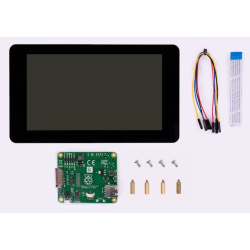Displays
Raspberry Pi 7" Touch Display 2 720x1280-pixel resolution (Official) (RPi display2 7inch)
This is an official 7″ touchscreen display for Raspberry Pi, for interactive projects like tablets, entertainment systems, and information dashboards.
Raspberry Pi Touch Display 2 (5” Portrait) (RPi display2 5inch)
This is an official 5″ touchscreen display for Raspberry Pi, for interactive projects like tablets, entertainment systems, and information dashboards.
Argon ONE V5 Industria OLED Display Module (Argon One V5 OLED)
Argon ONE V5 Industria OLED Display: Advanced Control and Monitoring for Raspberry Pi
Raspberry Pi 7" Touchscreen Display (Official) (display 7inch official)
This is an official 7″ touchscreen display for Raspberry Pi, for interactive projects like tablets, entertainment systems, and information dashboards.
Four Letter pHAT (four letter phat)
Use Four Letter pHAT to display... four letter words. Not that sort!




















